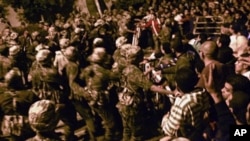Egypt's new prime minister named a caretaker Cabinet Sunday as armed men in plain clothes attacked hundreds of protesters demanding reform of the country's hated state security services at a rally outside the Interior Ministry in Cairo.
Dozens of men wielding knives, firebombs and rocks confronted demonstrators as Egyptian soldiers fired into the air and used stun guns to disperse a crowd that wanted to storm the state security agency inside the ministry building.
In the last two days, protesters have broken into 11 offices belonging to the state security police across the country, seizing documents they feared would be destroyed by officers to cover up alleged abuses by the force.
Dismantling the agency has been a key demand of the protest groups that led the uprising against former president Hosni Mubarak.
In a move designed to respond to such demands, Prime Minister Essam Sharaf named Mansour el-Essawy the country's new interior minister Sunday. He will replace Habib al-Adly, who is on trial for corruption charges. Mr. Sharaf also replaced the key foreign affairs and justice ministers.
His purge of Mubarak-era Cabinet officials meets some of the demands by reformers.
Nabil Elaraby, a former judge at the International Court of Justice, accepted his appointment as foreign minister. He will replace Ahmed Aboul Gheit, who has held the post since 2004 and is the most prominent of Mr. Mubarak's ministers to remain this long.
The reshuffle is another step by Egypt's ruling military council to respond to popular demands as it charts a course to parliamentary and presidential elections later this year. Last week, the council appointed Mr. Sharaf, a former transportation minister, to replace Ahmed Shafiq, whom Mr. Mubarak appointed during his last weeks in power.
Mr. Sharaf, a civil engineer, has the backing of pro-democracy youth protest groups. The new Cabinet will require the approval of the council, which is headed by Field Marshal Mohamed Hussein Tantawi.
Late Saturday, protesters stormed the main state security headquarters in the Cairo suburb of Nasr City, seizing documents, lists, photos, maps, diagrams and videotapes. On Friday, protesters said they found burned and shredded documents when they raided another security compound in the northern city of Alexandria.
A series of suspicious fires in security and financial investigation offices has some Egyptians convinced that senior officials are trying to destroy evidence.
By Sunday, protesters already were uploading some of the seized documents onto the Internet and disseminating them via Twitter and other social media sites. Egypt's prime minister and state prosecutor have urged people to return materials, in order to preserve national security.
Protesters Attacked in Cairo as Egypt PM Names New Cabinet




